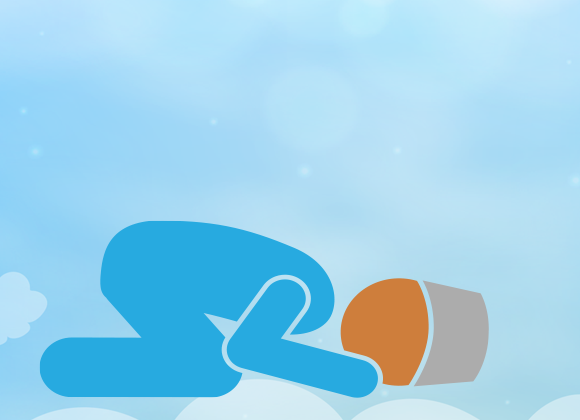
How to be happy? – The regularly asked question
Happiness: Have you ever wondered what it is? Is it a mood, a delusion, a state of mind or a way of life? What makes us happy? Does happiness actually exist in this world? In the Qur’an, Allah ![]() mentions happiness several times. For instance, the All-Mighty says:
mentions happiness several times. For instance, the All-Mighty says:
“Indeed the companions of Paradise, that Day [Day of Judgement], will be amused in [joyful] occupation.” (Yasin, 36:55)
“Enjoying what their Lord has given them, and their Lord protected them from the punishment of Hellfire.” (At-Tur, 52: 18)
When Allah ![]() mentions utter and complete happiness, He
mentions utter and complete happiness, He ![]() talks about the happiness of the next life. However, what about the happiness of this life? You can find several ahadith in the authenticated Sunnah and ayat from the Qur’an which encounter happiness in this life – and we can learn a lot from them!
talks about the happiness of the next life. However, what about the happiness of this life? You can find several ahadith in the authenticated Sunnah and ayat from the Qur’an which encounter happiness in this life – and we can learn a lot from them!
What do we need to be happy?
This question bothers humankind since the creation of man. Innumerable philosophers, psychologists, artists, poets and lyricists have tried to answer this question – and failed. Not a single one of them was able to develop an accurate and complete model of happiness. The most commonly known model is Maslow’s hierarchy of needs. It basically claims that our needs are: ![]()
- Physiological (sleep, food, air, water, etc)
- Safety (shelter, financial security, health, etc)
- Love/belonging (community, family)
- Esteem
- Self-actualization
- Self-transcendence (religion)
Looks quite logical, right? Maslow, however, claims that you can only gain happiness and contentment from faith or spirituality if all other needs are met. Is this what we believe in? To answer this question, we look at the noble Qur’an.
Allah ![]() tells us the story about Prophet Ibrahim
tells us the story about Prophet Ibrahim![]() who sent his wife Hajar and his son Isma’il
who sent his wife Hajar and his son Isma’il ![]() to a remote place in the desert where the Ka’ba was built later on. When he left, he made a profound du’a:
to a remote place in the desert where the Ka’ba was built later on. When he left, he made a profound du’a:
“Our Lord, I have settled some of my descendants in an uncultivated valley near Your sacred House, our Lord, that they may establish prayer. So make hearts among the people incline toward them and provide for them from the fruits that they might be grateful.” (Ibrahim, 14:37)
From this meaningful du’â we can derive that our needs are:
- Prayer/faith
- Community/family
- Food
If you compare it with Maslow’s hierarchy of needs, it is, indeed, exactly the other way around!
We can find the same meanings in the Sunnah.
Fadalah bin ‘Ubaid Al-Ansari reported: I heard the Messenger of Allah صلى الله عليه وسلم say: “Happiness is due to him who is guided to Islam and possesses provision that suffices him for his day and remains content.” 1
Narrated Al-Miqdad ibn al-Aswad: I swear by Allah, I heard the Messenger of Allah صلى الله عليه وسلم say: “The happy man is he who avoids dissensions: happy is the man who avoids dissensions; happy is the man who avoids dissensions: but how fine is the man who is afflicted and shows endurance.” 2
Nafi’ ibn ‘Abdu’l-Harith reported that the Prophet صلى الله عليه وسلم said, “Part of the happiness of the Muslim man includes a spacious dwelling, righteous neighbor and a good mount.”3
Therefore, we can raise or lower the level of our own happiness depending on our faith and deeds.
Are religious people really happier?
Studies have found that religious people tend to be happier than non-religious people. Moreover, the happiness of non-religious people tends to be transient while the happiness of religious people tends to be enduring. 4 How amazing is that!
My assumption is that religious people believe that each and everything that happens in our life has a meaning – and which religion gives more meaning to life, trials and tribulations than Islam?
The ultimate meaning of trials is to bring us closer to Allah![]() . Therefore, while you go through a tough time, you come closer to Allah
. Therefore, while you go through a tough time, you come closer to Allah![]() . And when ease comes after that hardship, you find yourself closer to Allah
. And when ease comes after that hardship, you find yourself closer to Allah![]() than before!
than before!
This is exactly what you can observe around yourself. Some sisters and brothers go through unimaginable pain, through seemingly unbearable trials. Some of these sisters and brothers are dazzling patient – and, therefore, Allah![]() places happiness into their hearts.
places happiness into their hearts.
So what can you do?
1. Prayer
The very most important step to happiness is prayer. We have seen the evidence for this statement in the prayer of Prophet Ibrahim![]() . We can read in the Qur’an:
. We can read in the Qur’an:
“No disaster strikes upon the earth or among yourselves except that it is in a register before We bring it into being – indeed that, for Allah , is easy.” (Al Hadid, 57: 22)
2. Stay away from prohibited deeds
“And whatever strikes you of disaster – it is for what your hands have earned; but He pardons much.” (Ash-Shurah 42: 30)
This âyah warns us of the evil consequences and punishments for the evil that we ourselves may have done.
3. Be optimistic – even in the darkest moment
You may know all ahadîth and ayat like:
“For indeed, with hardship [will be] ease.” (Ash-Sharh: 5 and 6)
“And the Hereafter is better for you than the first [life]. And your Lord is going to give you, and you will be satisfied.” (Ad-Duha 93: 4-5)
But “knowing in mind” does not equal “knowing in heart”. Internalize these ahadîth and âyât. You can write them on a paper which you carry with you to read every now and then. You can appoint a specified time every day to ponder over them- whatever – make sure you really internalize these promises!
4. Be grateful – even for the smallest thing
Even the sight of a butterfly, the fresh breeze of the morning air just before the sun rises, the blessing of being able to stand in prayer and touch the ground with your face directly… these are all tremendous blessings of our Lord!
5. Help others
“So as for the orphan, do not oppress [him]. And as for the petitioner, do· not repel [him].” (Ad-Duha 93: 8-9)
Allah![]() asks us to help others – especially when we are not fine ourselves. We will often find others who are far worse off than we are. And they are those who we should compare ourselves with in this world.
asks us to help others – especially when we are not fine ourselves. We will often find others who are far worse off than we are. And they are those who we should compare ourselves with in this world.
Abu Hurairah radiyallahu anhu reported: The Messenger of Allah صلى الله عليه وسلم said, “Look at those who are inferior to you and do not look at those who are superior to you, for this will keep you from belittling Allah’s Favour to you.”
6. Sajdah
Last but definitely not least: When you are happy, do not forget or even refuse to do sajdah (and thank Allah ![]() for all what He
for all what He ![]() has given you) where you are nearest to Him!
has given you) where you are nearest to Him!
It was narrated from Abu Bakrah radiyallahu anhu that when the Prophet صلى الله عليه وسلم heard news that made him happy, or for which one should be happy, he would fall down prostrate in gratitude to Allah ![]() , the Blessed and Exalted. 5
, the Blessed and Exalted. 5
Please share your thoughts with us about this article in the comments section below. 🙂
About the Author
Mirah has completed her General Islamic Studies Diploma at IOU Diploma Section and is presently doing BAIS Advanced Diploma, BSc Psy Advanced Diploma. She is the course Facilitator at Diploma Section (IOU) and also a Radio Presenter at Radio Uahid (Swiss Islamic radio channel) about Islamic parenting.
– Myers, David G. and DeWall, C. Nathan. (2015). Psychology Eleventh Edition, Worth Publishers, NewYork, pp. 487 & 513
– Park, N. Peterson, C. Seligman, M. (2004). Strengths of character and well-being among youth, Unpublished manuscript, U. of Rhode Island
- Riyad as-Sâlihîn, Book 1, Hadîth 513; graded: hasan sahîh ↩
- Sunan Abi Dawud, Hadîth 4263; graded: sahîh ↩
- Al-Adab Al-Mufrad, Hadîth 116; graded: sahîh li ghayrih ↩
- Myers, David G. and DeWall, C. Nathan. (2015). Psychology Eleventh Edition, Worth Publishers, NewYork, pp. 487 & 513 ↩
- Sunan ibn Mâjah, Vol. 1, Book 5, Hadîth 1394; graded: hasan ↩








10 replies on “6 Mind Blowing Ways to Achieve Happiness”
A great reminder that we have so much to be grateful about. Alhamdulillah for everything!
Asalam Aleikum,
AlhamduLilah I’m very delighted to find how we approach the whole concept of psychology in Islamic perspective. I personally find the article very challenging and also inspires the best way to find happiness.
Thank you
Nice article. I hope I can internalize all this.
Jazakallah Khair.
Alhamdulillah was salatu was salaām alā nabiyyina Muhammad, this article is so amazing and useful, Jazaakallahu khair.
Excellent article
Thanks for your efforts. Allah swt bless you always. Aameen
The article is indeed an eye opener or a reminder for some. And i believe no message carrying goodness reaches you unless almighty intends. Keep at it.
Jazak Allah.salam alaikum
Very inspiring article maa shaa Allah, Jazak Allah khairan
Jazakallahu Khairan. This article is inspiring. Its truly itemized things that one may do to have ultimate happiness in this life from a religious perspective.
This article is so basic.
If you want to be happy, pray and don’t do anything wrong? Really? Oh and be sure to distract yourself by helping others and being grateful with what you do have. A middle schooler could’ve given this answer.
There is nothing here that speaks to the truly searching Muslim or human being who sees suffering and loss happen all across the land.
This exact ‘Be grateful, and keep your head down’ mentality might work for the unsophisticated and non-curious individual but it is very easy to command someone to ‘BE GRATEFUL’, well how can I be grateful to a God when I see good things happen to bad people, and difficult things come my way?
How can you tell someone to ‘BE OPTIMISTIC’ if that means to suffer a failing abusive marriage, or to bear an incurable sickness, or to reconcile thoughts when they see cheaters and liars thriving in common society.
The answers to those questions should be answered by a mix of Figh or Aqeedah along with common sense.
This article applies very scant common sense, and begins to make a counterargument to Maslow’s established hierarchy, but right after fails to prove a body of supporting facts to the counterarguments main point: which is to ask for everything in reverse by asking Allah for help and then do the actual work. Oh and here’s a bunch of hadiths from the Sunnah to back up the idea of prayers for help first always.
All in all, the ‘Mindblowing ways to achieve happiness’ are not that mindblowing. Rather they’re common sense religious techniques that ask you to leave everything within the realm of Allah, and don’t ask you to really investigate your life decisions. It’s really easy to say trust in Allah and pray when everything is going right for you, but when it’s not? Well, a lot more common sense understanding of what Islam is, is needed. Maslow’s hierarchy really is the winning theory here.
Articles like these epitomize why the Ummah is experiencing the troubled times its in. We can no longer replace scientific theories and philosophies with the complacent mindest of ‘Pray, and inshallah it will be alright. Smiley face smiley face.’
I hope I’ve made myself clear.
Salam
[…] المصدر: 6 Mind Blowing Ways to Achieve Happiness – IOU Blog […]